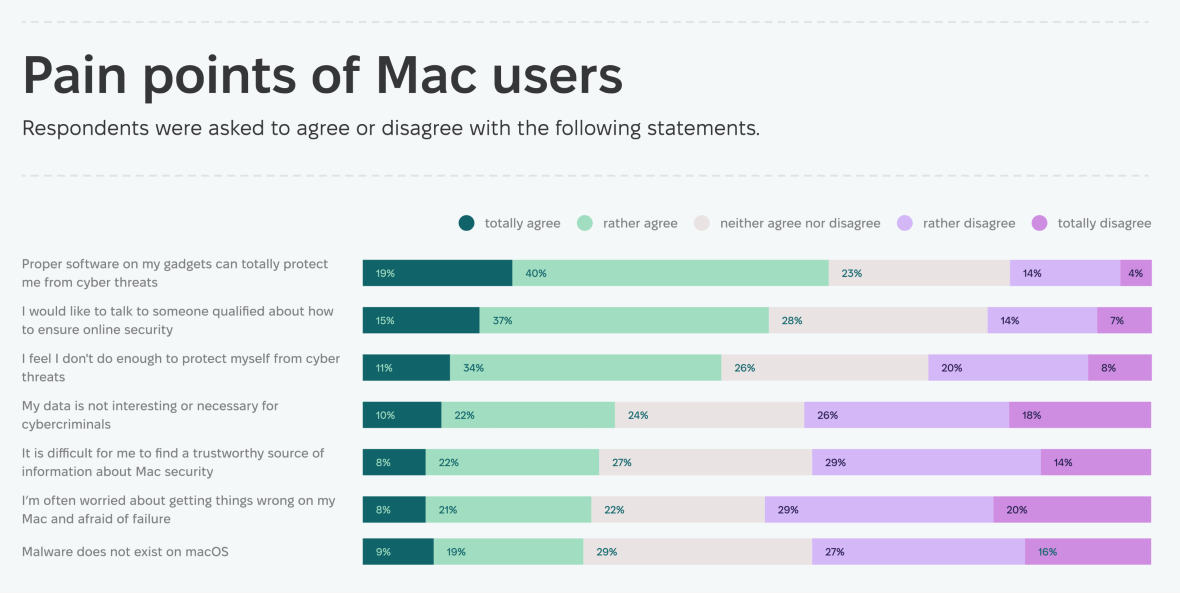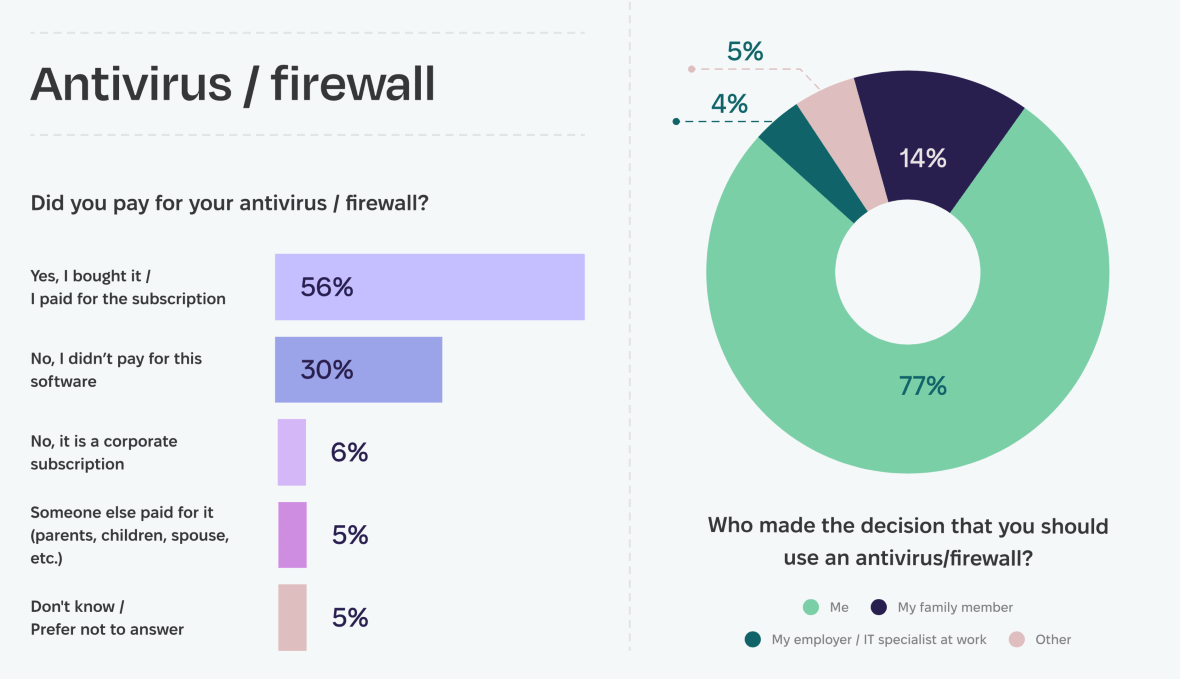If there is anything cybersecurity experts can agree on, it’s that 2023 has been a wild rollercoaster ride so far. Undoubtedly, the modern threat landscape is leveling up and becoming more sophisticated every day. From state-sponsored attacks to ransomware to data leaks, we are seeing it all.
As a company focused on the cybersecurity needs of Mac users, we thought it was important to understand how they are handling the turbulent security environment. So we set out determined to learn it all. From their worries and concerns to their behaviors and misconceptions, Moonlock’s Mac Security Survey 2023 gathered the insights of about 2,000 macOS users. Here’s what we discovered.
Key findings
At a glance, our initial results revealed that Mac users often struggle to navigate the complex digital world in which they live, work, relax, and socialize.
- Cybersecurity myths are still alive. 28% of Mac users believe malware does not exist on macOS. Additionally, every third user believes that their data is of no interest to cybercriminals.
- Awareness is high, but risky behaviors abound. Threat awareness levels are high, with more than 80% of users saying they are informed about cyber threats. Still, 31% admit that they skip updates, and 22% of them use the same password for multiple accounts.
- There’s a lack of clarity about security tools. Contradictions are widespread among Mac users. For example, some users say they use password managers, but they also save their passwords on their browsers.
- There’s also a lack of reliable info. More than half of users would like to talk to someone qualified about how to stay safe online, but 30% say it is difficult to find a reliable source of information.
- Mac users are there for each other. 54% share information about cyber threats, and 41% advise on safe online behavior.
What keeps macOS users up at night?
At times, what Mac users worry about and how they behave can be completely inconsistent. For example, while more than half believe that proper software can completely protect them against cyber threats, 25% of users install cracked software, and 31% skip updates.
Even more concerning is the fact that although 45% agree that they must do more to protect themselves from cyber threats, half of respondents say they store their passwords in browsers and even reuse them for multiple accounts.

When it comes to behaviors, there is also some room for improvement. For example, 73% of respondents say they pay for goods and services online, but only about one-third of them use a VPN when connecting to public networks.
How age and gender affect cybersecurity survey results
In any survey, there are clear differences between what different generations do, say, and believe, as well as how women and men approach the same issue. It is important for us to understand these differences to ensure that our services are balanced, fair, and representative of all groups.
Different Mac users, different worlds
We found that men and women and different age groups perceive macOS security in unique ways. For example, the younger users are, the more they feel they “don’t do enough” to protect themselves from cyber threats. Similarly, users aged 55 or more are more concerned about cybersecurity, with 31% to 35% of them agreeing that they are often worried about getting things wrong on their Mac and are afraid of failure.
When it comes to gender, the most notable observation is how this difference affects users’ perceptions of Mac malware myths. A stunning 37% of men believe that malware does not exist on Mac, while only 23% of women say the same.
Men and younger users take higher risks
The common stereotype that men and young people are more likely to take risks proves true — in the context of cybersecurity on Mac, anyway.
Our survey shows that men:
- Install cracked software more often than women
- Skip updates more frequently
- Have to log in to shared devices more
- Are more likely to accept friend requests from strangers
It also comes as no surprise that younger generations follow the same lines when compared to older respondents. Those between the ages of 25 to 44 are more likely to engage in risky behaviors than older Mac users.
50% of Mac users have experienced attacks
Cybersecurity awareness plays a vital role in securing digital environments. The more information users have on threats, the better they can protect themselves. Unfortunately, sometimes it takes an eye-opening incident for people to understand the consequences of digital security. We wanted to know how many macOS users had experienced cyberattacks, and what we discovered was alarming.
More than 50% of respondents say they have been directly affected by malware, hacking, or scams personally or through someone close to them. These attacks have shaped their knowledge.
Of those surveyed, 80% say they are aware of:
- Scams
- Account hacking
- Password stealing
- Identity theft (including SSN theft)
- Breaches of personal data
- Collection of personal data from browsers and social networks
- Phishing
- Payment threats
The biggest concerns for more than 50% of respondents are identity theft, account hacking, and online payment security.
Our survey also shows that the younger generations, who are usually considered more tech-savvy, feel less aware of cyber threats than those aged 55 and older. Additionally, users aged 18 to 24 perceive the likelihood of these threats affecting them as lower.
Men tend to rate the likelihood of all threats higher, which may be the reason why women report being more likely than men to have been affected by account hacking and stolen passwords (30% vs. 24%).
What about security software?
From antivirus tools and firewalls to ad and tracker blockers, password managers, and VPNs, the world of digital security and privacy solutions is as diverse as it is extensive. But what software are Mac users turning to to keep safe?
According to respondents, antivirus tools, VPNs, and storage services are the most purchased solutions, outperforming any other security products. And antivirus tools, firewalls, and password managers are their top security software picks.

Almost half of surveyed users (49%) use antivirus or firewall, and 46% use password managers. But there’s a catch. When asked what software they use, 6% of antivirus and firewall users said they rely on macOS built-in security solutions. And 11% of self-reported password manager users said they store their passwords in browsers.
These findings are among the strangest paradoxes we’ve uncovered. Users say they use password managers — but in reality, they store their passwords in browsers. Or say they are aware of cyber threats — but still trust that built-in security makes their Macs immune to malware.
Users say they are aware of cyber threats — but still trust that built-in security makes their Macs immune to malware.
But who decides to buy security software, and who pays for security services? As remote work becomes the norm, it is not uncommon for companies to provide their workers with security solutions. Additionally, family members may decide for others in their group.
Women are much more likely to say that the decision to use specific software was made not by them but by another family member. Women are also much less likely to use paid software compared to men.
A little help from my friends
Most of us have someone among our family members, work colleagues, or friends who is the go-to technology person and patiently explains the advanced concepts we tend to struggle with. Among Mac users, supporting one another is also a factor. Whether it may be older relatives and parents, partners, friends, or children, Mac users tend to offer each other cybersecurity support.

We found that support is a two-way street. About half of those surveyed (43%) help others by providing advice on how to avoid cybersecurity threats, and 47% receive the same support, while 32% will do both. Not surprisingly, younger users are more keen to help older ones, with those aged 25 to 44 coming up on top as the most supportive group (55%).
But how are macOS users supporting each other?
- 54% share information about possible cybersecurity threats
- 41% advise on safe online behavior
- 38% answer people’s questions when they have a particular problem
When offering support, users recommend the following software:
- Antivirus and firewall: 55%
- Secure browsing, browser add-on: 46%
- VPN: 41%
- Secure data storage and backup: 39%
- Ad blocker, tracker blocker: 36%
- Password manager: 34%
- Data leaks monitor: 24%
- Apps for remote access to devices: 23%
There are varying levels when it comes to how supportive someone is, and our survey shows that some users will take a more active, hands-on approach. They offer more than advice and will install or update software (38%), and they will monitor system health and clean and optimize devices (31%).
Final thoughts
We had no idea what we would discover when we first set out on this journey. Today, with the results in our hands, we are confident that there is much work still to be done in Mac security.
Thanks to these Mac users who shared their time and concerns with us, we have learned a lot. At first glance, the issues we revealed seemed to be caused by users’ shortcomings. In reality, they are gaps and failings of the security industry and the wider sector.
If cybersecurity myths are still alive, with approximately one in three users believing that malware does not exist on macOS, security experts must increase their awareness campaigns and efforts. Myths are liabilities. They lead to people making bad decisions and being misled, negatively impacting users, businesses, and society as a whole.
Our survey also clearly signals that it is time to ask the big questions and be ready to answer them. For example, why do 80% of users say that they are informed about cybersecurity and yet still engage in risky behaviors?
From password security in browsers to the availability of Mac security experts for users to talk to, the Moonlock Mac security survey tells us that there are gaps to be filled. And with more than half of Mac users helping each other learn and stay safe, we have found the inspiration to move forward.






